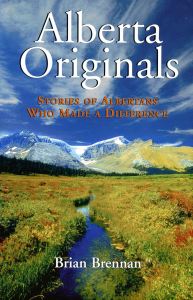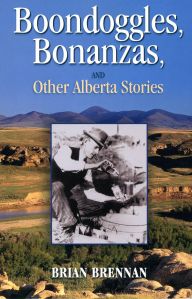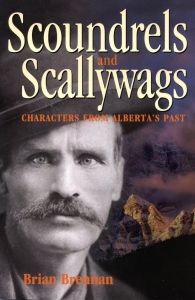Brian Brennan has been featured previously on Reading Recommendations five times, and is back now with information on how he’s managing to keep his traditionally published out-of-print books in print.

Don’t Let Your Books Go Out of Print!
By Brian Brennan
That’s the advice I would give to any author who receives a statement from their trade publisher listing their book’s status as “OP.”
I received three such statements from my publisher, Fifth House, in 2014:
One was for Alberta Originals: Stories of Albertans Who Made a Difference, a book of biographical profiles that had sold more than 5,000 copies after it was published in 2001.
The second was for Scoundrels and Scallywags: Characters From Alberta’s Past, which had become the most successful of all my books, with more than 10,000 copies sold after publication in 2002.
The third was for Boondoggles, Bonanzas and Other Alberta Stories, which sold a comparatively modest 3,000 copies after publication in 2003.
I didn’t like the idea of my titles going out of print. I was particularly saddened to see Scoundrels disappear from the catalogues because it had been my favourite. Villains always make for more interesting stories than those who walk the straight and narrow. I decided I would keep all my titles available by self-publishing them as ebooks.

Human Powered Design, an independent Canadian company that specializes in turning manuscripts and print-design files into ebooks, did the EPUB conversions for me. It then sent the titles to Amazon (Kindle), Kobo, Apple (iTunes) and OverDrive, the American company that distributes ebooks to libraries across North America. That put the books back into circulation, at least, but left me feeling it was not enough. As much as I enjoy reading books on my iPad – especially while away on vacation – I still like to hold a print book in my hands and savour the tactile enjoyment of leafing through the paper pages. I believe others feel the same way.
Enter CreateSpace the on-demand publishing company owned by Amazon. I sent CreateSpace the press-ready cover and interior PDFs I had asked Human Powered Design to generate for me after it did the EPUB conversions. And for no charge, CreateSpace uploaded the PDF files onto its platform, making them available as print-on-demand books that could be purchased from Amazon, Barnes & Noble, Ingram, indiCo and other retailers.
So how does CreateSpace make money if it doesn’t charge anything upfront for publishing books on its platform? It waits until the paperbacks start selling and then collects a percentage. In most instances, this works out to about 60 per cent of list price for CreateSpace, which leaves 40 per cent for the author. This arrangement suits me just fine. Fifth House used to pay me a royalty of 10 per cent for my paperbacks.
The CreateSpace versions of my three books resemble the Fifth House versions because I have the PDFs of the original designs. Without these, I could still have republished the books because CreateSpace provides do-it-yourself authors with free tools, including a cover creator and interior reviewer. For a fee, I could also have availed of the professional services CreateSpace offers for designing book covers and interiors.
All three of my books focus on the colourful personalities and social history of Alberta. If you’d like to learn more about or purchase any of them, either as paperbacks or ebooks, here are the links:
Alberta Originals
Scoundrels and Scallywags
Boondoggles and Bonanzas

My thanks to Susan for allowing me to take up some of her valuable online space to post this.
 Myrna Kostash
Myrna Kostash




